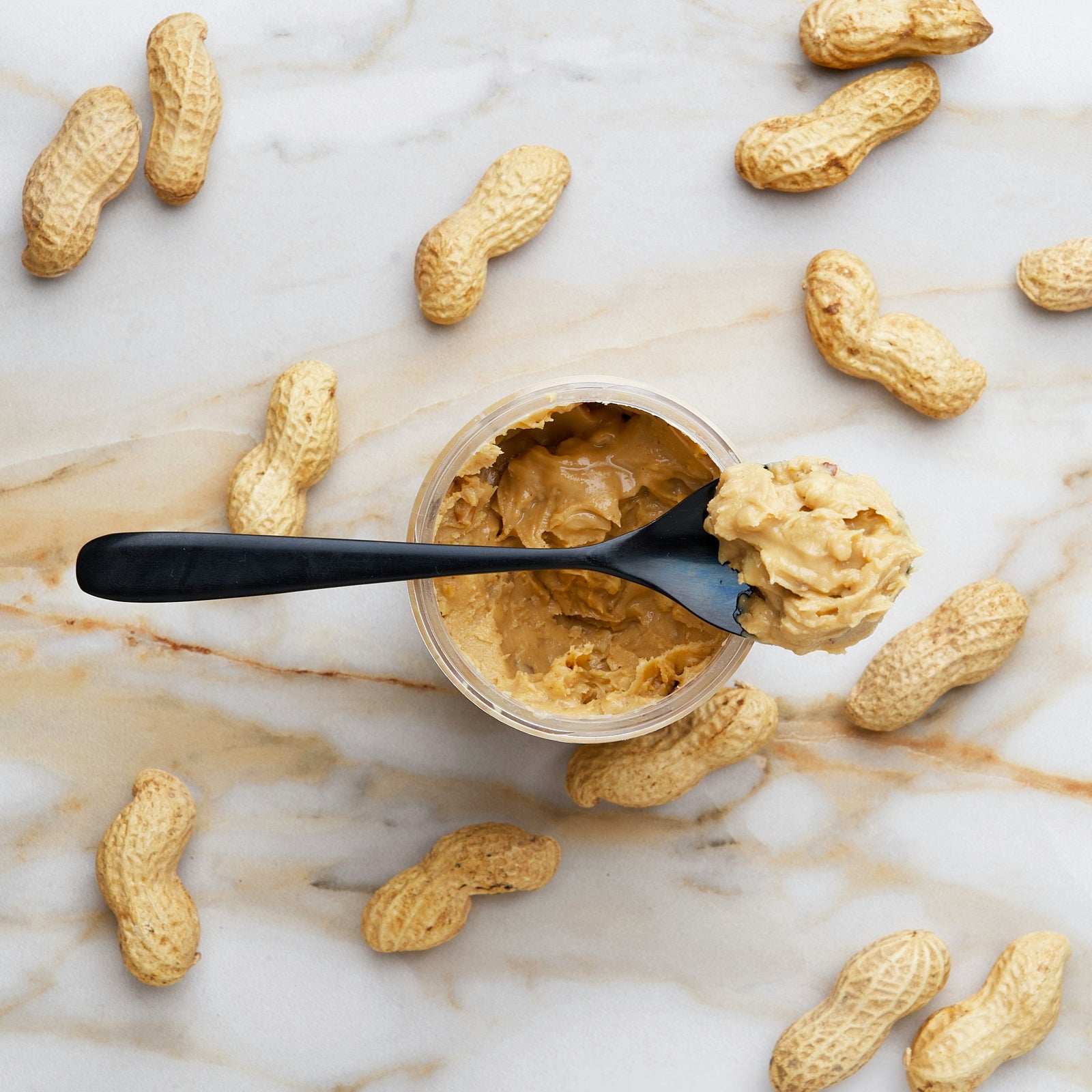Peanut Butter vs. Whole Peanuts: Which is Healthier?

Peanut butter versus whole peanuts is a common comparison for anyone trying to make healthier snack choices. While both come from the same nutritious source, there are a few key differences worth exploring. In this article, we’ll break down the benefits of each to help you decide which one fits your lifestyle and wellness goals.
Nutritional Breakdown: Peanuts vs Peanut Butter
Peanut butter and peanuts both provide heart-healthy fats, plant-based protein, and essential nutrients, making them smart choices for a balanced diet. But when it comes to simple, wholesome nutrition, whole, unsalted peanuts tend to have a slight edge over peanut butter. Whole peanuts are minimally processed and contain no added ingredients, while peanut butter can sometimes include oils, sugar, or salt, depending on the brand.
Below is a nutritional comparison between a 32-gram (2 tablespoon) serving of Hampton Farms Creamy Peanut Butter and a 30-gram (1/2 cup) serving of shelled, unsalted Hampton Farms in-shell peanuts.
|
Whole peanuts come out slightly ahead in terms of sodium, calories, and fiber per serving. Still, both peanut butter and peanuts provide a nutrient-dense snack packed with protein and heart-healthy fats.
No matter which one you choose, both options deliver a range of essential nutrients that support overall wellness, including:
- Biotin – Helps convert food into energy; supports skin, hair, and nail health
- Copper – Aids in energy production and supports the nervous system
- Niacin – Supports digestion and helps convert food into usable energy
- Folate – Aids in cell division and supports prenatal health
- Manganese – Helps process cholesterol, protein, and carbohydrates
- Vitamin E – An antioxidant that protects cells from oxidative stress
- Thiamine – Supports heart, brain, and nerve function
- Phosphorus – Essential for healthy teeth and bones
- Magnesium – Important for muscle, nerve, and heart function
Benefits of Eating Whole Peanuts
Whole peanuts are a naturally satisfying snack packed with fiber, healthy fats, and protein. Since they’re minimally processed, they retain their nutritional integrity and contain no added sugars or oils. Eating whole peanuts may be better for satiety due to their fiber content and the slower pace of eating. Having to chew and shell peanuts (when eating in-shell varieties) may help prevent overeating. Eating peanuts is better than eating peanut butter if you’re looking for more control over portions and fewer added ingredients. They’re also a great snack option for people looking to add heart-healthy fats to their diet in the most natural form possible.
Benefits of Eating Peanut Butter
Peanut butter has been a nutritional staple since the late 1800s, though its origins go back to the ancient Inca and Aztec civilizations. Today, natural peanut butter is still made primarily from peanuts, which means it retains most of the same nutrients, including protein, healthy fats, fiber, and a variety of essential vitamins and minerals.
What makes peanut butter especially appealing is its convenience and versatility. It’s easy to spread, stir, and scoop, making it ideal for smoothies, sauces, baked goods, and snacks. Natural peanut butter offers nearly the same health benefits as whole peanuts, with the added bonus of being ready-to-eat and easy to incorporate into a variety of meals. Whether you prefer it creamy or crunchy, it’s a nutrient-dense option that fits well into a balanced diet.
Peanut Butter vs Peanut Spread
Not all peanut butter is created equal, so it’s important to read labels carefully. Natural peanut butter typically contains at least 90% peanuts, with optional small amounts of salt, sweetener, or oil. Other products, however, may be labeled as peanut spread instead.
Peanut spreads contain less than 90% peanuts and often include added sugars, hydrogenated oils, and flavorings. These extra ingredients can affect the overall nutritional value, offering fewer of the health benefits usually associated with peanuts.
If you’re choosing between peanuts or peanut butter for health reasons, be sure to distinguish between natural peanut butter and peanut spread. Sticking with a simple, minimally processed option ensures you’re getting the most from your snack.
Peanuts and peanut butter offer a range of benefits, including essential vitamins and minerals. The better choice depends on your lifestyle and preferences. If you're looking for a minimally processed, fiber-rich snack, whole peanuts are a smart option. If convenience and versatility are key, natural peanut butter is a great way to get the same nutrients in a different form.
Whichever you choose, Hampton Farms has you covered with high-quality, great-tasting peanuts and peanut butter you can feel good about.


Leave a comment